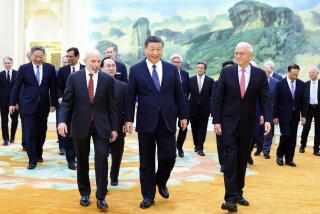Gorbachev Asks U.S. Business for More Trade
- Share via
MOSCOW — Soviet leader Mikhail S. Gorbachev said Tuesday that the Geneva summit opened the door for better economic relations with the United States but complained that “political obstacles” imposed by Washington still block any major increases in trade.
Gorbachev, addressing the largest group of American business leaders ever to assemble in Moscow, attacked U.S. controls on high-technology exports to the Soviet Union and said the idea that Soviet military potential depends on Western technology is “complete nonsense.”
He said removal of those restrictions, as well as the ban on official U.S. credits and most-favored-nation trade status for Moscow, would allow the two superpowers to become natural trading partners. Because the Soviets have been denied most-favored-nation status, high tariffs are slapped on most goods entering the United States.
“So long as those obstacles exist, there will be no normal development of Soviet-U.S. trade and other economic ties on a large scale,” Gorbachev said at a Kremlin banquet in honor of 400 visiting American business executives.
“This is regrettable, but we are not going to beg the United States for anything,” Gorbachev said in a speech that generally favored expanded trade and Soviet-American cooperation.
A special restriction in U.S. law--popularly known as the Jackson-Vanik amendment--withholds most-favored-nation status and official credits from any country that does not follow open emigration policies. The Soviet Union has long claimed that this 1974 law, sponsored by the late Sen. Henry M. Jackson (D-Wash.) and former Rep. Charles A. Vanik (D-Ohio) to spur the Soviets to issue exit visas to Jewish citizens, amounts to interference in its internal affairs.
Secretary of Commerce Malcolm Baldrige said after a meeting with Gorbachev that significant gains in trade could be achieved under present law.
“We are closer to the beginning than the end in creating a fully normal U.S.-Soviet trading relationship,” Baldrige acknowledged. “Yet we are on the right road, and I believe we made progress in our meetings here this week.”
Baldrige put the Reagan Administration’s stamp of approval on the post-summit effort by the U.S.-U.S.S.R. Trade and Economic Council to open new trade avenues. Last year, total trade amounted to about $3.8 billion, with the balance heavily favoring the United States because of its large grain sales to the Soviet Union.
Gorbachev’s meeting last month with President Reagan in Geneva, however, has raised hopes of increasing non-farm exports, especially machine tools and automated assembly lines, to the Soviets.
Asked about Gorbachev’s complaints, Baldrige said the U.S. government has loosened some strategic controls on exports. As for repealing the Jackson-Vanik provision, Baldrige said there are no plans to do so at this time. He said that in any case, repeal “would not get through Congress.”
Gorbachev said that removal of trade obstacles would open “broad prospects” for bilateral trade and would allow Moscow to demonstrate that it would be an “honest and reliable” business partner for the United States.
More to Read
Sign up for Essential California
The most important California stories and recommendations in your inbox every morning.
You may occasionally receive promotional content from the Los Angeles Times.













